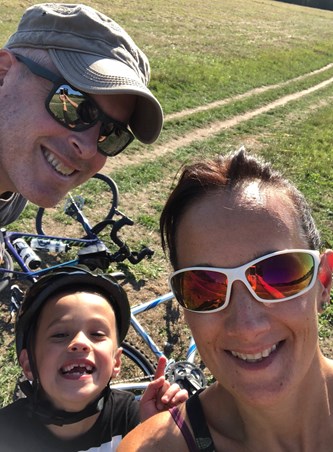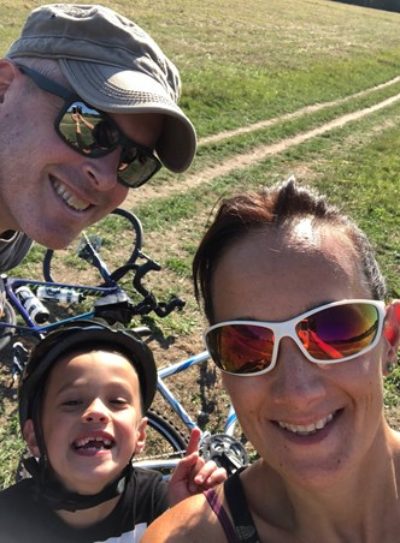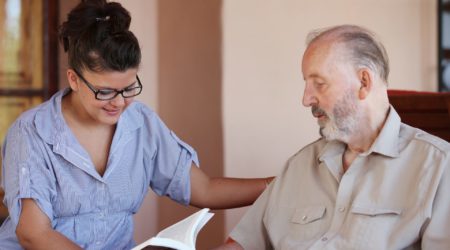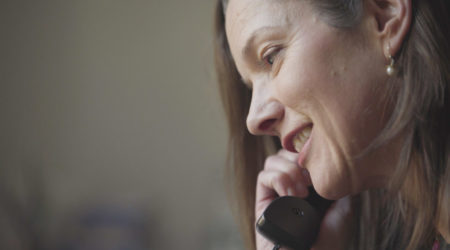



Julia
Julia shares her experience of pancreatic cancer, after her husband Rob was diagnosed in 2018.
Looking back now I realise that Rob, like so many other people, had lots of the symptoms but at the time we had no idea what it was. He was diagnosed with pancreatic cancer in February 2018 but he’d been having symptoms about two or three years before. It took a long time for him to get a diagnosis.
He started having stomach pains and over the years he had lots of tests done but they didn’t show anything. They gave him an endoscopy but found nothing. His mood was often low and he’d get tired. His doctors suspected he had a stomach ulcer or IBS, it never crossed our minds that it might be something more sinister.
It got bad quickly
When the stomach pains stopped for about several months we thought he was in the clear. We had just come back from a holiday to Italy and Rob thought that he’d broken his leg. He had suddenly had sharp pains in his lower leg to such an extent that we got emergency medical help out to our apartment. It turned out that he hadn’t hurt his leg, it was a blood clot. It wasn’t until later that we found out that blog clots can be a sign of cancer. Straight after that he got a bad chest infection so they gave him an x-ray and the tumour, by complete fluke, showed up on the x-ray. That was how we found out he had a tumour on his pancreas.
It was just totally out of the blue because he was only 49, was so fit and was working full-time. After his diagnosis it got bad quickly. I know you can’t compare cancers but you often hear about people with breast cancer or prostate cancer and they’re on a fifth or six line of treatment – there just seems to be so many more options. But with pancreatic cancer there isn’t and I found it quite shocking.
All along we were hoping for the Whipple’s operation but Rob’s cancer was locally advanced. The tumour was twisted around his arteries which meant it was too complex and high risk for surgery. Straight away he was put on to chemotherapy to shrink the tumour. Initially he responded really well but then it stopped working. Then everything just sort of…crashed.
Looking back I do feel like we did everything that we possibly could. We tried everything.
People are full of good and bad advice but a lot of it is pseudoscience. There were lots of lovely people telling us to take herbal remedies which was well-meaning but we just had to be really careful and make sure we were going to use reliable sources.
It’s so important that you can speak to someone who actually knows what they’re talking about instead of just scaring yourself with Google searches. I spoke to the Pancreatic Cancer UK specialist nurses several times via the Support Line. They talked us though other possible treatment options and how we could manage conversations with consultants around this. Deep down we knew where it was going but knowing there were other options out there gave us hope. It just kept us going. We didn’t ever give up.
Looking back I do feel like we did everything that we possibly could. We tried everything. We never asked how long he had but we both knew it was terminal and made preparations for that.
Pancreatic Cancer UK was really useful because the charity’s specialist nurses were completely neutral but so empathetic. It helped to have someone to talk to openly about it. It was hard because obviously we’ve never been in that position before and we didn’t know how to handle it. The nurses mentioned a hospital in Germany where patients are able to send information through to be reviewed and then arrange a consultation for higher risk Whipple’s operations. So we went out there to see the consultant and in the end he said he could do the operation but Rob would need a little bit more chemotherapy first, to shrink the tumour more. But in that time it got worse.
At this point we felt like there was nothing left for them to do. We tried to get this other drug called Abraxane® but our consultant wasn’t too keen on it and it’s not funded by the NHS unless the cancer is at a certain stage. Rob also had a new treatment called Nanoknife® which is supposed to ablate the tumour. They recommended going to Germany again for another treatment, a localised chemo treatment.
We knew we had no time to lose
We knew we had no time to lose so 3 weeks later we were out there again. On the way to our appointment he began to be sick and bleed, it stopped for a while, long enough to get us to our appointment. We met with the consultant and arranged to proceed with treatment. As he left the room Rob then collapsed and began to bleed again. This continued for several days with emergency procedures being put in place to stop the bleed.
At one point he seem to recover but as the days went on he grew worse. Both of Rob’s sisters flew out to Germany and supported us during these last days, I’m not sure what I would have done without them as I was stuck out there with my 8 year old son and Rob in hospital.
It turned out the tumour had grown into the duodenum and caused a bleed which turned out to be a catastrophic bleed and he died out there. We thought he would be in a hospice for a few months before he died. It was so sudden in the end. It wasn’t the end we expected.
Doing something positive
I planned to take on Prudential RideLondon-Surrey 2020, unfortunately the event was cancelled due to the coronavirus pandemic. I hope to be able to do something positive for the charity that had helped us so much soon.
August 2020




